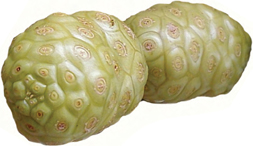
Noni is the common name for Morinda citrifolia, a tropical tree native to Polynesia, especially to Tahiti and Hawaii. Polynesian kahuna, or traditional healers, have used noni fruits, leaves, stems, and roots in foods and beverages for the last two thousand years.
Noni fruit has a very distinctive odor and taste. Many people, especially when trying it fresh in the tropics, are repelled by the smell at first, but after eating the fruit over time come to love the taste. The health benefits definitely make this superfood well worth it!
The plant produces an irregular, lumpy, egg-shaped fruit reaching four or more inches in length. The ripe fruit has a strong, pungent odor. The seeds float due to inner air chambers and can withstand prolonged exposure to salt water. Noni is believed to have spread to Asia, Australia, and the Americas initially by seeds floating on ocean currents, and later by Polynesian traders and settlers. Noni was a founder crop of the original peoples who populated the Hawaiian Islands.
Modern research has identified several important nutritional compounds in noni. Noni fruit is full of many powerful antioxidants and compounds that support health such as selenium (skin elasticity, skin health), xeronine (cell structure health and regeneration), glycosides (defense against free radicals), scopoletin (anti-inflammatory properties), terpine (helps the body detoxify), limonene, and anthraquinones (antiseptic properties, particularly effective for people with compromised immune systems). Studies have suggested an exciting finding: that noni increases the efficacy of the immune system by stimulating white blood cells via the power of long-chain sugars (polysaccharides). Polysaccharide compounds (such as 6-D-glucopyranose penta-acetate) found in the fruit are generally believed to increase the overall killing power of white blood cells.

Noni juice is a potent antimicrobial and antifungal enzymatic beverage created during the fermentation of the noni fruit. It is generally considered to have far more health properties than any other fermented fruit products, including wine and vinegar. If you live in or visit a tropical region like Hawaii, be sure to try the noni fruit fresh. You can blend up the entire ripe fruit in coconut water, strain it, and drink it on the spot! Consuming fresh noni creates a psychoactive “high” that never seems to have any “low.” It is all good news, nonstop, forever. By all indications noni appears to boost “feel-good” serotonin. Raw NoniLand™ noni powder and noni fruit leathers that contain the same psychoactive and health-enhancing properties as the fresh noni are now available.
Newly discovered compounds found in noni leaves have proven to be rich in flavonoids and other antioxidants that help protect cells and tissues from free-radical damage. Tea made from the leaves helps to improve digestion, maintain normal blood sugar levels, and eliminate toxins from the body. The tea also has antimicrobial, antibacterial, and antifungal properties. Preliminary evidence suggests that the leaves and seeds of noni contain omega-3 fatty acids.

The flavor of noni leaf tea is extremely pleasant. It tastes a bit like coca tea with hints of green tea. Noni leaf is relaxing and contains no caffeine or stimulants of any kind. No trace of the pungent odor or taste of the noni fruit or noni juice is present in the leaves of the noni tree. These leaves can be dried into noni leaf tea. Noni leaf tea is a great way to ingest the great health-giving compounds of the noni plant. Picking noni leaves from the noni tree does not damage the tree in any way; in fact, new leaves grow back swiftly and abundantly in their place.